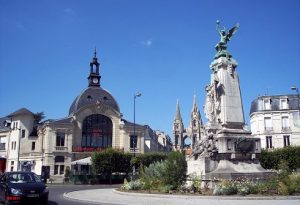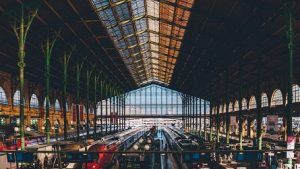
From unsplash.com / © Andy Newton
So adieu, EU. Boris Johnson has finally achieved an agreement by which the United Kingdom can withdraw from the European Union at the end of 2020. During the painfully protracted negotiations it looked like Johnson was going to end up with a ruinous no-deal withdrawal, but no doubt he was deliberately prolonging the negotiation process until Christmas. This was so that (a) when he agreed to a deal on Christmas Eve, he could spin himself as Santa Claus delivering the UK a bumper Christmas present, and (b) members of Britain’s parliament would have hardly any time to scrutinise the 1246 pages of the agreement’s details before voting on its approval on December 30th. Meanwhile, the more the agreement does receive scrutiny, the clearer it becomes how shit it is, for everything from Britain’s financial services sector to its fishing industry.
One thing the agreement closes the door on is Britain’s participation in the Erasmus programme, which had allowed 15,000 British students annually to study in European universities without paying fees. Johnson has spouted some bollocks about it being replaced by a British-run scheme to be named after the British mathematician and computing genius Alan Turing. If such a thing ever gets off the ground, I’m sure it’ll be run by some private company headed by a member of Johnson’s ‘chumocracy’, it’ll farm British students out to eye-wateringly expensive universities in the USA and it’ll be affordable only to the offspring of Britain’s privileged, moneyed classes.
This reminds me of a lengthy entry I put on this blog in 2017, about the first time I ever left the British-Irish Isles and entered a non-English-speaking country. I did this thanks to the European Economic Community (EEC), which became later the European Community (EC) and then the EU we know today, and through a small programme that existed five years before Erasmus came into being. Anyway, it seems timely to post that entry again….
In the spring of 1982 I was about to finish high school and I resolved to take a year out before I went to college. No one else in my school year intended to do this. Those with plans to go to college were doing so six months later in the autumn. And everybody around me, especially my parents, seemed to believe I was mad for postponing entry into college by a year-and-a-third so that I could do absurd things like… Well, what exactly was I going to do? I had vague dreams of travelling and seeing something of the world, and of funding this travel by doing short jobs here and there, hopefully abroad. But as the end of high school neared, my year-out plans remained worryingly nebulous.
Incidentally, nowadays, it seems you’re considered mad if you don’t take a year out, or a gap year as it’s called in modern parlance, between school and college. Indeed, employers expect it to see it on graduates’ CVs as an indicator of boldness and initiative. I was just 38 years ahead of my time but didn’t know it.
Eventually, I went and tormented my school’s careers advisor for ideas and she suggested a programme I could try for part of my year out. The EEC was funding young people in its member countries to visit other EEC countries and conduct short projects about some aspect of life in them. The thinking was that this would give young people a better understanding of their EEC neighbours and thus create better, more empathetic EEC citizens. All you had to do was complete and send off an application form, which if accepted got you a grant of about £250. Then you made your own travel and accommodation arrangements, headed for the EEC country of your choice, did your research, wrote a report and submitted it a few months later.
I decided to go to France, because apart from the Republic of Ireland it was the closest EEC country to the UK and hence the cheapest one to get to. Also, I’d studied French for six years at school and shouldn’t have too many communication problems. Or so I thought.

© histoiredeçinema.canalblog.com
For my French base, I decided to use the town of Soissons, about 100 kilometres northeast of Paris. This was because my high school in Scotland ran a student-exchange programme with a school in Soissons, some of my teachers kept in touch with the teachers there, and I’d heard that the Soissons school had rooms on its campus that could be temporarily rented out. So I asked the head of the French Department at my school if he could drop one of his Soissons counterparts a line and arrange something on my behalf.
I was dubious if anything would actually come of this. But to my surprise, in May 1982, I received a letter from a Soissons teacher called Monsieur Masson confirming that he’d booked me a room for me for three weeks the following month.
And what would my project be about? I didn’t know what career I wanted to follow, but if people asked me I usually told them I intended to be a journalist, because I read a lot of newspapers and liked writing. It was this journalistic predilection that made me propose going to France, doing research into French newspapers and investigating how they covered the big stories that were affecting Britain at the time. How different would the French perspective on such stories be from the British one?

© Le Figaro

© Le Monde
Actually, about half-a-year after I’d typed up and sent off the report, I was in Waverley Station in Edinburgh one day when I saw, at a newsstand, a whole rack of newspapers on sale from other countries, including France. Among them were most of the newspapers I’d consulted for my project, like Le Monde and Le Figaro. I realised then that such newspapers were sold in Scotland in places like Waverley Station because lots of foreigners passed through them. And, guiltily, I realised that I could have stayed in Scotland and done the exact same project by buying those French newspapers in Edinburgh. Thankfully, the EEC never cottoned onto this and never demanded their £250 back. (With the Internet, of course, you could do the whole project today without ever leaving your house.)
I set off for France at the start of June. I was 16 at the time, unused to travelling, ignorant of foreign cultures and generally utterly naïve. The experience that followed was so intense that I really only remember certain moments of it where my impressions were either strongly positive or negative. Here, I’ll describe the bad stuff first and then relate the good stuff.
I didn’t enjoy the journey. I’d booked seats on the night-train from Edinburgh to London. As well as being my first time in continental Europe, this was also my first time on a train and my first time to travel to London. Then I was scheduled to use a coach service that ran from Bedford Square in central London to the Gare du Nord in Paris, with the cross-channel part of the trip being made by hovercraft. Needless to say, this was my first time in a hovercraft too.
When I got off the train at six o’clock in the morning at King’s Cross Station in London, I immediately decided that the station, and by extension London itself, was bloody horrible. I know that today’s King’s Cross Station has been done up and is a site of pilgrimage for young foreign tourists who worship the Harry Potter books and want to see Platform 9½ there, where Harry, Hermione and Ron would board the Hogwarts Express. But back then the station was shabby, dank and disreputable. It was populated by vagrants, most of whom were pissed even though it was only six a.m. and most of whom, disconcertingly, seemed to be Scottish.
My opinion of King’s Cross Station didn’t improve three weeks later when, during the journey home, I traipsed through one of its entrance doors and a pair of skinheads promptly ordered me to shut the door behind me. Tired and not thinking properly, I assumed they were employed by the station and did as they said. I turned around and spent a minute trying to get the door to shut, until I realised it was an automatic one and wouldn’t shut until I stepped off its pressure sensor or moved out of the way of its motion sensor. Then those skinheads guffawed and ran off.
The Gare du Nord in Paris, from which I planned to get a train to Soissons, was less grungy. But it was here that I made a shocking and embarrassing discovery. I couldn’t speak French. At least I couldn’t speak real-world French, as opposed to classroom French. With hindsight, all I had to say to the lady in the ticket booth was “Soissons s’il vous plait. Aller simple.” But I tried to word my request as a sentence – “I’d like to buy a…” – and it came out as gibberish. Then I didn’t understand what the lady asked me in reply. Finally, after a nightmarish minute of miscommunication whose memory still haunts me to this day, and while a queue of impatient Parisian rush-hour travellers lengthened behind me, she managed to identify the name ‘Soissons’ amid my gibberish and gave me the necessary ticket.

From unsplash.com / © Moiz K. Malik
It was nearly dark when I arrived in Soissons. By the time I got to the lycée Monsieur Masson had long since gone home and I had to deal with a bemused caretaker. He found me a room where I could spend the night, although it hadn’t been inhabited for a long time and was full of cardboard boxes, dust and stale-smelling air. I lay on the bed wondering if this grim place would be my abode for the next three weeks. (It wouldn’t, of course. When the administrative staff came in the next morning, they saw to it that I was put in a different room, a clean one that even had a balcony and a view.)
Despite it being June, I was wearing a big bulky coat with loads of pockets, handy for carrying things in. My grandmother had been visiting my family in Scotland when I set off and she’d given me a giant bar of Dairy Milk chocolate to eat on the journey. I hadn’t had dinner that evening but at least in my fusty room I could snack on that. I stuck my hand into a pocket to retrieve the bar and discovered it’d dissolved, messily, thanks to the intense body heat I’d exuded all day inside that unseasonably heavy coat. Then I noticed some big brown smears on the back of my coat. How had the molten chocolate leaked out there? Then I noticed the odour coming off those smears and realised they were dogshit. At some point, I’d accidentally set my rucksack down on some pavement-poo. When I’d hoisted the rucksack onto my back again, I’d transferred the poo to my coat.
But thinking about it now, I see how most of the bad moments related to getting to Soissons. When I was in Soissons, however, the good moments began to happen.
Firstly, it soon dawned on me how kind and helpful people were, even if my communication skills were so woeful that I must have appeared as a gurning, inarticulate man-child. Particularly hospitable was my contact in the teaching staff, Monsieur Masson, who with his stylish clothes and immaculately trimmed beard reminded me of the French actor Michael Lonsdale when he’d played Hugo Drax in the 1980 Bond movie Moonraker. As well as checking up on me regularly to ensure I was okay, he and his family invited me to have dinner and stay at their charming Soissons home the night before I returned to Scotland. Happily, there was enough of my £250 left for me to buy him a bottle of Scotch whisky as a thank-you gift. To my surprise, he immediately drank a measure of it out of a glass stuffed with ice cubes. What, I thought, you can drink whisky with ice cubes? Nobody I knew in Scotland did this. They just drank it neat or with tepid tap-water. And kept drinking it. Until they fell over.
Then there was the pleasure of discovering a place very different from what I was used to. I’d wander through residential areas of modern blocks of flats that were colourfully painted and had flowers growing out of pots and window-boxes. Where I came from, blocks of flats were associated with failed 1960s planning, urban deprivation and vandalism. Most of the shops were no larger than those in my home town but they looked unfeasibly smart and chic. As part of my arrangement with the lycée, I got breakfast and an evening meal there every day and I also discovered the French dining experience. Breakfast wasn’t about stuffing yourself with Weetabix and fried egg and bacon. It was a simple but delicious ritual of dunking pieces of fresh baguette into a bowlful of coffee. Dinner didn’t come with everything piled willy-nilly on one plate but as a series of little courses – hors d’oeuvres, soup, fish, a main course, some salad, desert. Bewildering but somehow very civilised.

© PolyGram Filmed Entertainment / Universal

© Kennedy Miller Productions / Warner Bros
It was also strange seeing cultural items you were familiar with through a French prism. I spent ages in Soissons’ bookshops, wanting to find out which of my favourite novels had been translated into French and what their French titles were. I went to the cinema one evening to watch Costa Gavras’ newly released political thriller Missing, starring Jack Lemmon and Sissy Spacek and set in Chile after the Pinochet coup of 1973. It was dubbed into French, but by this time my French-comprehension powers had improved and I understood about half of it. What puzzled me was why the French had decided to give Costa Gavras’ deadly-serious movie a Woody Woodpecker cartoon as its supporting feature. Also, they showed the trailer for Mad Max II, with the consequence that even today when I watch that Mel Gibson post-apocalyptic action-classic, I hear a solemn French voice intoning, “Mad Max… Deux!”
I was unhappy with the report that I finally submitted. It seemed crude and slipshod and not remotely how I’d envisioned it being. But its topic was certainly a good one to be focused on during a sojourn in a foreign country. Studying how the French press depicted Britain was an eye-opener. As Robert Burns wrote wisely in his poem To a Louse, “To see oursel’s as ithers see us / It wad frae mony a blunder free us…”
One story I covered in the French newspapers was Pope John-Paul II’s visit to Britain, which was happening while I was in France. It was the first time a reigning pope had ever been on British soil and the visit had sparked protests by such predictable figures as the Reverend Ian Paisley and his Glaswegian Mini-Me, Pastor Jack Glass. Although John-Paul II was a socially conservative pope and France seemed a very liberal Catholic country, French commentators were surprised and upset that anyone in Britain could object to his presence. Not very scientifically (or geographically, since the protestors were Northern Irish or Scottish), one writer in Le Figaro explained it thus: “In the north of England, they still believe in ghosts.”

© thepapalvisit.org.uk

From historyimages.blogspot.com
However, the biggest British news-item during my three weeks in Soissons was a war. Britain was fighting Argentina over possession of the Falklands Islands. Coming from Britain, where the Falklands War had sent most of the newspapers into a bellicose, jingoistic frenzy, the detachment and scepticism on display in the French press were discombobulating. Many French commentators, even in Le Figaro, which was supposed to be conservative, seemed to echo the famous remark by the Argentinian writer Jorge Luis Borges that the conflict was like “two bald men fighting over a comb.” Meanwhile, a gruesome cartoon in the satirical weekly Le Canard Enchaîné that depicted a naked Margaret Thatcher making love to a missile and wailing, “C’est bon! C’est bon!” has been etched on my memory ever since.
Thus, it was a project about newspapers that first induced me to leave Britain and start exploring the rest of Europe. And during the rest of my year out, I would build on that Soissons trip. By the time I got to college in the autumn of 1983, I’d been in Switzerland, Germany, Liechtenstein, Austria, Belgium and Holland too.
Ironically, newspapers were now been instrumental in building barriers between Britain and the rest of Europe. The British newspapers owned by a cadre of right-wing magnates, like Rupert Murdoch, Lord Rothermere and the two Barclay Brothers, did much to create the hysterical, xenophobic atmosphere that led to a small majority of the British public voting for Brexit in 2016.
I find it sad to think that the EU, in its old EEC incarnation, gave me my first opportunity to travel; and travel, as they say, helps to broaden the mind. In modern Britain, where many minds could do with broadening, such opportunities have been considerably reduced. 75% of British voters in the 18-to-24 age group voted to stay in the EU, but young Britons will now find it harder to study in Europe, work in Europe and even travel in Europe. The Brexit vote, largely the responsibility of an older and more reactionary electorate, has put a damper on such aspirations.
Back in 1982, I didn’t know how lucky I was.

From unsplash.com / © Adam Wilson
